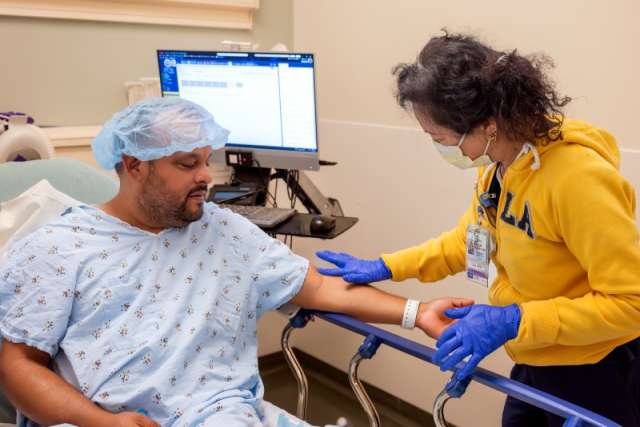When Louie Mejia learned that he had kidney disease, it caught him completely off guard. It was 2020, and he already was living with diabetes and high blood pressure. He had routine labs and bloodwork done, but for unknown reasons was not alerted that there were concerning results related to his kidneys. A year later, when Mejia‘s doctor told him his kidneys were failing, his response was one of surprise and confusion.
“I didn't know anything about kidney failure,” Mejia recalled.
Nearly a year after his diagnosis, Mejia found his way to UCLA Health and Anjay Rastogi, MD, PhD, clinical chief of nephrology.
On July 31, 2024, Mejia received a pre-emptive kidney transplant — a transplant done before kidney function has deteriorated to the point where dialysis is necessary — marking a significant milestone in his battle against kidney disease.
Growing up unhealthy
Mejia grew up in Carson, California, and faced the challenges of living in a rough neighborhood. He and his community lived in a food desert, and he learned little about proper nutrition and its impact on health.
“I had zero education about health, eating right or exercising,” he said. “It was just liquor stores and all the other stuff I had to deal with growing up in a poor neighborhood. I was a product of my environment.”
He learned of Dr. Rastogi by chance when he saw a photo on Instagram of his close friend, Elizabeth Espinosa, at an event with Dr. Rastogi.
“I texted Elizabeth. ‘Hey,’ I said. ‘I see you’re at a kidney gala.’ I told her I was sick and had kidney disease and asked if she could connect me with Dr. Rastogi.”
She immediately connected Mejia with Dr. Rastogi. “He was amazing,” Mejia said. A remote appointment was set up for the following day, a Sunday, and the call lasted more than 90 minutes. “He listened to me, gave me a treatment plan, and from there on I knew I was in good hands,” Mejia said.
When Mejia expressed interest in giving back to his community by sharing what he had learned during his medical journey, Dr. Rastogi invited him to join the CORE Kidney Program at UCLA Health. The program — comprised of donors, recipients and advocates — offers resources and support for patients and provides a comprehensive approach to kidney health. It helped Mejia learn more about chronic kidney disease and connected him with other UCLA Health specialists.

Moving toward transplant surgery
Because Mejia did not want to go on dialysis, he elected to undergo a pre-emptive kidney transplant. “Dr. Rastogi and his team helped me navigate the complex process,” Mejia said. “He introduced me to another key CORE Kidney member, Dr. Mrinalini Sarkar, [a nephrologist] who became an important member of my care team. I am also grateful to the UCLA transplant team for their exceptional care.”
Mejia did face some challenges when it came to finding an organ donor. His sister, Katherine Ioramo, volunteered to be his living donor, but she was not a match.
Then Dr. Rastogi told Mejia about the UCLA Health Kidney Exchange Program and how it could help him find a donor and receive a kidney transplant sooner. Without hesitation, Ioramo agreed to donate her kidney through the exchange, which expedited Mejia’s transplant.
“My sister is so strong,” Mejia said. “We never had much growing up, but she’s always been tough. I’m so thankful to her.”

Life after transplant
Mejia’s transplant transformed his life and strengthened his resolve to continue helping others. Now, he is dedicated to advocating for the CORE Kidney Program, focusing on outreach to low-income and underserved Spanish-speaking communities.
“The support I received from UCLA Health and CORE Kidney has been invaluable,” he said. “I want to encourage anyone going through kidney disease to know they have a family that awaits them in the CORE Kidney Program,” he said. “I’m here for them. Dr. Rastogi is here for them. We’re not just friends and volunteers; we’re family. As Dr. Rastogi says, ‘You must be your own best advocate.’”
And he extended his thanks to the broader UCLA Health community. “A special thank you to Johnese Spisso, the president of UCLA Health. I had the privilege of meeting her and want to thank her, UCLA Health and CORE Kidney for all they do for patient care,” he said. “I was treated with respect, dignity and kindness.”
Dr. Rastogi applauds Mejia’s engagement. “A couple of years ago, Louie came to CORE Kidney and UCLA Health lost and without any hope. CORE Kidney and UCLA Health gave him hope and a path forward,” he said. “Our promise to him was fulfilled, and Louie got a pre-emptive living kidney donor transplant. This is transformational not just for Louie and his family, but also for patient advocacy and support. Louie is committed to dedicating his life to CORE Kidney, increasing kidney health awareness and supporting patients in need so they can also experience and believe in the power of hope.”




